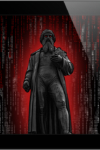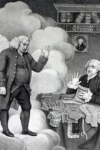 Set in a near future in which an extra-national pharmaceutical company has become the de facto governing body in the United States, Miles Klee’s debut novel Ivyland follows the (mostly) drug-addled residents of a fictional New Jersey town.
Set in a near future in which an extra-national pharmaceutical company has become the de facto governing body in the United States, Miles Klee’s debut novel Ivyland follows the (mostly) drug-addled residents of a fictional New Jersey town.
More than any other novel I’ve read, Ivyland reads like an acid trip: with multiple narrators and a jarring juxtapositions of images and voices, Ivyland always seems on the verge of complete disintegration. It’s a chaotic, cynical, hilarious, dystopian book that’s held together by Klee’s immense compassion for his fucked-up characters and his considerable skill as a novelist.
I spoke to Klee about Ivyland, neoliberalism, Rush Limbaugh, and psychedelic drugs.
You spent five years working on Ivyland. At the novel’s release party you alluded to the fact that a lot of those years were spent doubting what you were doing.
At every stage — every time you get one step further in the game — people are like, “Well, you should be happy that you made it this far because the next thing may not happen.” I got an agent and it was like, Oh, that’s great. But then it didn’t sell. He took it around to a dozen of the big guys who could possibly take a chance on something like this. They all had very nice things to say and wanted to see the next book. You got the feeling that when they did like it, they still couldn’t pull the trigger.
Do you think it was the architecture of the novel that prevented people from taking a chance on it?
That was what a lot of them said: “Too chaotic, too schizophrenic, too jarring.” Those were the terms that came up the most.
Too “hysterically real”?
It’s funny that you bring that up — I’m obsessed with hatchet jobs and love reading dudes who are just eviscerating what they’re going after. I always read Dale Peck. It’s always a blast.
When they bring up these kind of genres [like “hysterical realism”] that they’ve identified as what’s wrong with fiction today. My problem was that I love to read those takedowns. I’m like “That’s exactly what I’m doing! That’s me to a T.” It annoyed me that they already seemed to have a handle on what I was doing.
I would bring this stuff up to my agent. I’d express my neuroses — he’s there to tell me to shut up. He was like, “Well, on the one hand that’s kind of bullshit. You read that stuff because it’s fun bullshit. On the other hand, you can’t write anything trying to guess what the audience is going to do. You can write for one person at most.”
Ivyland is set in New Jersey. Did you grow up there?
I’m from Brooklyn. Born in Brooklyn; from a huge Brooklyn family; grew up in Jersey.
New Jersey is the butt of so many jokes, but so much of that stuff doesn’t track when you’re actually there. Ivyland seems to contain every part of Jersey in it.
The geography is mashed together in a totally unsympathetic way. That way it could have all of that in one space. I wanted commuter-ville, but also the Pine Barrens. That’s what’s cool about the state. Though I guess you could say that about any state — they’re all different from corner to corner.
In those kind of rural/suburban areas there’s nothing going on, but there still can be a kind of dynamism — although maybe it’s because those places are so boring that you just take as many drugs as you can.
I think, unlike New York, it’s a place that’s open to more change. Change happens slower in a place like Manhattan. You can walk around now and it’s still kind of like a Woody Allen movie, if you want it to be. I think other places — and I think of Detroit, specifically — nature can grow over all that shit pretty fast. New York will take a little bit longer to decompose, but you’ll see plans overtaking you in the suburbs first. Those abandoned McMansions and homes you never sold.
There are plenty of books about corporate takeover, but the takeover in Ivyland is much less seamless than the one in, say, Super Sad True Love Story, and your treatment is far less winking. In Ivyland lawlessness trickles down from corporations to the people themselves.
I don’t necessarily think about it in terms of corporations, because I think we’re losing the distinction between a sovereign wealth fund and an independent intelligence agency — if you’re rich enough, you can start your own C.I.A. You’re having not international, but ultranational entities. And those have no rule of law.
Globalization means that capitalism wins. If that’s the case, then capital is all you need to be a functioning entity in the world. If you have a couple people and a billion dollars, there’s no limit to what you can do.
Growing up in the ’90s, the first thing I remember hearing about globalization was basically: “corporations can do more to help developing countries than their governments can.” With the economic crisis it seems like we’re seeing the result of what happens when corporations have more power than governments in most countries, and it’s not pretty.
At this point, companies [still purport to be] improving lives, especially in the third world, but the only incentive is [seeing an] untapped market for their product there. So the definition for improved lives becomes: “you have our cars.” Car makers look at India and see 800 million people who don’t have a car — “let’s sell them all cars!” It’s not necessarily something that’s improving the quality of life in that country. But it’s packaged that way, it’s sold that way, it’s accepted that way.
The internet has coincided with the rise of globalization and neoliberalism. Why no internet in Ivyland?
I just never figured out something interesting to happen with it! I guess I felt like the form replicates an internet experience more than the book could. Something could happen online, but it’s more of a pain in my ass for it to happen online.
I guess if the driving thing [in fiction] is conflict — and that’s a very simplistic view — then an internet conflict just doesn’t get you anywhere.
Internet conflicts do still seem inferior to real life conflicts. The internet creates a kind of barrier between interested parties.
It’s passive aggressive. Reposting, commenting . . . that’s a different book. If I wanted to write a book about how people are disconnected by the internet, that’s something else to attempt on its own. It’s kind of distracting to have the internet in a book.
My own phobia of it is that somehow writing about anything that happens online instantly feels dated. If I tried to write about what’s happening on the internet in 2012, it was sound like it was happening in 1993. I’ve noticed this in a couple books, like Boxer Beatle. [The protagonist] has these interactions with people online and, yeah, it’s exactly what would happen, but it still robs something from confrontation. I just don’t if anyone has figured out how to write the internet yet.
. . . There’s something about being the last generation to actually have to remember someone’s phone number and punch it in, no text messages.
Do you still remember those numbers?
Oh, fuck yeah. Even less than the digits, you remember how the fingers go. Sometimes I don’t know the number, but I know the pattern. It’s debatable what you lost in that, but it’s definitely different.
I still don’t know if anyone has figured out how to write the internet well.
Blake Butler, maybe?
The form takes the style of skipping around web pages back and forth, refreshing, not even finishing the thing you’re on.
That seems to go hand-in-hand with the experience of taking pyschedelic drugs.
Definitely. If only it wasn’t so hard to look at a computer screen while you’re tripping! It just hurts your eyes, which is very meaningful, I think. It’s like, This is very bad, you shouldn’t be staring at this all day!
Go outside, motherfucker!
Go look at some clouds, stat.
The structure of Ivyland definitely replicates the experience of tripping. So much of that seems to be the almost hallucinogenic parade of images, both real and fantastic.
If I’m developing a dogma about art, I think it’s only about juxtaposition. There’s no meaning without that — in the way a word can only mean the thing itself, there is no meaning until you set a thing next to something else. So, I think the succession [of images in the novel] works in a way — well, I hope it does — where they create some kind of dissonance or harmony with each other.
It’s almost like an experimental film, in that way.
Yeah, definitely. In the way that when people were first fucking around with film, [the question is] well, what do you put after that thing? The Battleship Potemkin thing: you have the carriage going down the stairs, the old woman’s glasses broken. I guess there’s nothing else but that in terms of how you create a meaning. To have a cascade of them is interesting to me. I like the idea that you don’t ever get the whole truth, because you never get that.
One of my favorite parts in Ivyland is your treatment of talk radio, which is hysterical. Do you listen to a lot of that stuff?
I don’t, but if anyone ever links to someone going on some screed on talk radio, I always listen to it. If someone posts Howard Stern going off for 12 minutes on gay marriage or whatever, I’m like, I’ll listen to that! Sometimes you listen to the worst shit Rush says because he couldn’t have said that, though of course, he definitely did.
I love whenever anyone gets really up in arms about something someone says [on talk radio.] As if that doesn’t happen all the time.
During the most recent Limbaugh controversy, his defense was just, “Look, I just fight absurdity with absurdity.”
Even when politicians were asked about it they will use his talking points, rather than their own: “He’s just being absurd.”
Nobody has benefited more from postmodernism than the right wing.
It’s very Dadaist! That you can’t say two things without contradicting both of them is a beautiful thing. That’s why Colbert is better than the Daily Show at this point. You don’t have to agree with yourself to have that viewpoint. They’ve solved the problem of self-contradiction: you embrace it. “Government, stay out of my business! Unless someone is trying to have an abortion . . .”
I think pretty soon positions will just dovetail in this very nightmarish talking point speak.
Speaking of Rush Limbaugh, have you gotten any pushback regarding the drug content in the book?
No, that hasn’t been a problem. I think people are really into drugs. Drugs are always going to be hot. I think it would be different if it took one stance or another, but they’re a fact of life more than they’re evil. Short of the atomic bomb, I think that the inventions of humanity can hardly be good or evil.
In Brave New World the fear is an all-powerful state using drugs for social control. You clearly know your Huxley, but the vision in Ivyland is somewhat different.
I love Huxley. I think that the funny thing is that if there’s one thing that Brave New World got wrong it’s that the government is not nearly competent enough to pull something like that off. It’s going to be a company. It’s going to be something not attached to land or history. Those are fetters. Barack Obama is completely constrained; a corporation is not bound by that.
He has to rule by consent.
And with respect and gravitas, as concerns the office and the last 250 years of this country. Ideally, for me, someone would get up and say, “You know what, America has always been bullshit. You know what, you’re a bunch of ignorant shitheads. You’re all gonna get educated. You’re all gonna buy into this neoliberal utopia. Shut the fuck up. It’s what’s good for you.” You can’t do that.
That’s the most painful thing about history — you have to have a deference to what came before. You can’t talk shit about everything [that deserves it] — even if it was the fucking Civil War and you’re fighting to keep slaves, I’m not allowed to be like, “You’re assholes for wanting to keep slaves.” Or even people who were abolitionists but fought for the South because that’s my country, my culture. Culture is a ball and chain: you can’t get away from that shit. Starting over from scratch is a bit drastic, but let’s dial it way back.
The geographic thing does seem to be getting weaker, at the very least.
Kids that grow up now don’t seem especially like they’re from one place. They’re growing up online, which is everywhere. You’re bound by who you’re carpooling with, but you can lead a richer and richer life online. I think you get a lot of people who only want to live on there.
There was an article in the Wall Street Journal saying something to the effect of “the hours people have spent playing World of Warcraft is now equal to the number of hours humans spent evolving.”
Fuck. The internet can compensate for a lot of stuff, but — at least not yet — it can’t make the last step into total immersion. You’re still bound by having to go across town. But, like, I do interviews over email. This [interview we’re doing now] is more fun for me though, because I can get drunk. Or at least, I don’t have to drink on one end of the phone while wondering, “Am I the only one drinking?”
To get back to Huxley for a second — The Doors of Perception is fantastically boring, for the first great book about drugs.
I love how dry he is. I feel like it’s the only honest thing ever written about drugs. It’s incredible. Literally no one else is telling it like it is. Movies don’t do it; books don’t do it. I feel like that’s why I want to make up new shit. I don’t want to explain what getting high is! I’ll have something new and people won’t know what to expect.
But that book, it’s so honest. It’s so granular, so bit-by-bit. If you ask [anyone else], “What is it like to trip balls?” There’s never been an answer where I’m like, “Yes. It’s that.”
It’s funny, too, because now I realize that I chose a quote [for the epigraph that was] maybe more appropriate to the form the book takes, but the real thing that kills me is that for [Huxley], the drug is not enlightenment — that’s really important. You’re taking away the funnel of information: all the shit flows into you; your brain stays busy because there’s more important shit going on. I think that’s the thing that stuck most with me most.
It is amazing how fucking difficult it is to explain what it’s like to be high, or to trip balls. And how much a kind of aesthetic has crept into how we try to explain it.
I think of it as eliminating any signposts as to what you’re supposed to pay attention to. I think that’s what being high is.
Aspects of the book seem to resonate with the themes of the Occupy movement. Did that surprise you?
Not to say that I was so prescient or anything, but the book became more timely as I was writing it. I think when I started it was just a very pessimistic, dark satire. Then certain stuff started to come true in a very frightening way. I was writing about these bridge collapses, then it started happening.
It would be one thing if the book came out before all that. It kind of all happened at the same time. When I was in the depths of trying to make the book a reality, that was when the economic catastrophe happened. I guess I fooled myself into writing something more realistic than I meant to.
The accidental prescience is really fascinating. I was listening to the Blueprint Vol. 2 this morning. “A dream” samples the first line of Biggie Smalls’ “Juicy”: “Time to get paid, blow up like the world trade.” That song is one of the best rags-to-riches songs ever, but it has nothing to do with global terrorism. “A dream” totally recontextualizes that.
It’s bizarre, too. Someone like Susan Sontag probably completely anticipated this, but anything that has the World Trade Center in it seems somewhat prophetic. It’s like, “No, that was just the background! That was the skyline. It was the characteristic thing.” Now it feels like it was predicting the absence with its presence.
This post may contain affiliate links.







